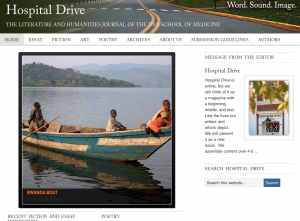It’s not often you sit down with a doctor to talk about poetry.

A confession: I have an MFA in poetry, and I’ve always been fascinated by the intersection of literature with science and medicine. My graduate research papers covered William Carlos Williams, poet and doctor; and A.R. Ammons, who worked in science before he ever penned a line.
But in these days of increasing specialization in academic fields, people don’t tend to talk cross-disciplines. I’ve spent time in both worlds – poetry conferences and medical meetings – and it’s rare to come across someone passionate about both.
Daniel Becker, MD, editor-in-chief of the School of Medicine’s literary publication “Hospital Drive,” proves a refreshing exception. When I asked about his favorite poets, he didn’t hesitate to answer: “Shakespeare. Wallace Stevens. Charles Wright. Jane Hirsch. Tony Hoagland. Dean Young. Elizabeth Bishop. Frank O’Hara. Kenneth Koch.”
I was impressed.
And so began our conversation about humane medicine and medical humanities: Doctors writing to ease stress, healthcare providers listening to patient stories to be more effective, patients writing to heal, and a poetry journal about medicine that brings everything into a new perspective.
The Poet Doctor
Becker has a lot of roles in addition to “Hospital Drive”: He’s director of the Center for Biomedical Ethics and Humanities and practices palliative care medicine.
His story is emblematic of a general trend. The merging of science and humanities is part of a movement that’s gaining some momentum, even here at UVA.
Not surprisingly, Becker started out college wanting to be an English professor. “But I ended up in medical school, scared about Vietnam, meeting expectations. Turned out it was the right thing to do.”
He found a way to balance both interests: “I took English classes at night. I always enjoyed writing well; good writing makes me happy. Later, I started writing poems to secretaries for their birthdays and Christmas, trying to have fun as a division head.”
Becker eventually turned this hobby into an initiative. “I know anybody who wants to write wants to appear in print. There were a couple of literary reviews that seemed affiliated with medical schools or a hospital — Bellevue Literary Review, Ars Medica. I thought that something could be done with an online literary review that wouldn’t cost much money that we could run out of our back pockets. The dean was supportive. With a little bit of money we were able to put it online.”
Now Hospital Drive is on its 10th issue, still all-volunteer.
Other writers have been grateful. “I’ve gotten Christmas cards from people we’ve published.”
Who submits poems, stories, art? “Anyone who wants to write about healthcare issues, about being ill or recovering or loss.“
The difference between scientific or medical descriptions and poetic descriptions of disease and illness is not just in the terminology. “In poetry, something really powerful happens; when you use ordinary language, you miss the mystery and the power.”
Narrative Medicine
Writing and helping others write about medical-related issues isn’t the only way Becker has found to unite science and humanities.
Becker tells me about Robert Coles, a child psychologist and author of the book The Call of Stories, in which he “tells of patients he met as a resident and how, until he decoded who they were as people and got their stories right, he was frustrated in his attempts to help them.”
And thus “narrative medicine” began: The idea that “unless you get the patient family story right, you’re not going to do an adequate job taking care of them,” Becker explains. “Imaging, lab tests, medications – all of that doesn’t approximate suffering, loss, family dynamics – how a father’s illness affects mother, kids, for example.”
Inspired by this concept, Becker spends time getting a patient’s story, despite time pressures and the focus medicine often puts on the latest technology. Becker believes this holistic approach is the best way he can provide care to his patients.
Writing and Healing
Bringing writing into medicine can help the healing process, too.
“Writing does something to the brain that relieves stress,” Becker offers. There have been studies showing the health benefits of writing. “If you take college kids who volunteer and encourage them to write about a difficult personal experience and compare them to students who didn’t write, they have an easier time in college, go to student health less often … It’s been reproduced in clinical setting.”
Medical Humanities at UVA
Becker attends the Taos Health Professionals Writing Retreat every summer and the national gathering at the University of Iowa on “The Examined Life: Writing and the Art of Medicine.” And here at UVA, he teaches and helps develop writing seminars for doctors, social workers, administrators, and nurses. There are classes offered in the School of Medicine on literature and medicine, art and medicine, history and medicine offered through the Center for Biomedical Ethics and Humanities.
It’s all part of the medical humanities movement that addresses burnout in health professions. “What it takes to find balance, part of that is a meditative approach, the flow state that happens when you start writing and hours go by and you hardly notice it.”
Why has this become so popular? “The more medicine gets commoditized, industrialized, there’s a counter-reaction to hang onto the personal.”
I ask Becker if he would quit medicine in order to write, but he shakes his head. “First and foremost I try to be a good doctor. I’m happy to write privately.”